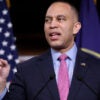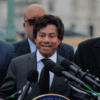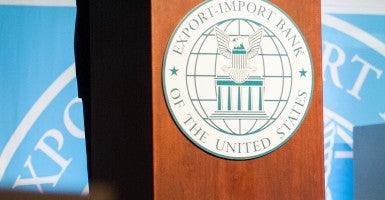Officials of the Export-Import Bank are peddling all sorts of reasons to continue subsidies for foreign firms that purchase U.S. products. Most of the claims are misleading, if not patently false, and thus easily dismissed. But there is one that is causing a bit of unnecessary worry for some lawmakers, i.e., the notion that U.S. firms will be disadvantaged if Ex-Im is not reauthorized and other countries maintain export credit agencies (aka “unilateral disarmament”). The facts below should soundly dispel such concern.
The “disarmament” argument presumes that export subsidies are necessary to compete in the global market. Or as Rep. Todd Rokita, R-Ind., said, “If the governments of the rest of the industrialized world are doing this, then it’s a question of fairness to our own folks.”
But good intentions alone do not equate to sound policy. Although Ex-Im benefits a select few, it comes at a cost to the rest of America. Subsidies are never the most efficient use of public resources; the government allocates capital on the basis of political interest rather than economic merit. Foreign recipients of Ex-Im largesse gain a competitive advantage over domestic firms that go without. Taxpayers, for their part, are on the hook for any and all bank losses that are not covered by reserves.
Despite the fear-mongering about foreigners stealing American jobs, members of Congress can rest assured the consequences of allowing the Ex-Im charter to expire will be inconsequential. Here’s why:
- The absence of export subsidies would not mean the end of exports. The vast majority of U.S. exports— 98 percent—do not receive assistance from the bank. For those who lose the aid, there is no shortage of private sources of investment. And the companies that benefit most from the subsidies— large and successful corporations, such as Boeing, General Electric and Caterpillar—enjoy unparalleled access to private capital.
- Ex-Im classifies only a small proportion of all its assistance as necessary to counteract export subsidies in other countries. In fact, the amount of Ex-Im authorizations by the U.S. bank actually swamps the other G7 nations (Britain, Canada, Germany, France, Italy and Japan) and yet still involves only a fraction of American sales abroad.
- Finance costs are only one among a variety of factors that affect a purchaser’s choice of supplier. Availability, reliability and stability all play significant parts in purchase decisions. There should be no question that U.S. firms are capable of competing successfully without corporate welfare.
- There is no such thing as a “level playing field” in trade. Every country possesses advantages that others lack. The ingenuity and drive can trump the comparatively measly export subsidies doled out by foreign governments—assuming, of course, that tax and regulatory barriers do not further restrict free enterprise.
- Reauthorization of Ex-Im will do nothing to remedy the actual barriers to even more export growth, i.e., high corporate tax rates and the record-high budget deficits that push hundreds of billions of dollars into treasury securities instead of business investment.
The Ex-Im bank has played only a marginal role in expanding the overseas market for American goods and services. Members of Congress need not worry that export credit agencies overseas somehow will overcome America’s bounty of advantages. Countries that continue these subsidies will be harmed, and the United States will benefit from their elimination. Or as Ronald Reagan once said: “We’re in the same boat with our trading partners. If one partner shoots a hole in the boat, does it make sense for the other one to shoot another hole in the boat? Some say, yes, and call that getting tough. Well, I call it stupid. We shouldn’t be shooting holes; we should be working together to plug them up.”































